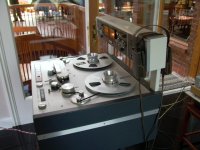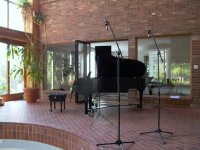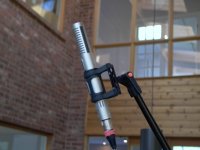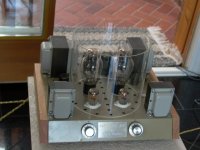Hi there
In a high end audio system when most of things already in top of the line, but still looking for improve, because there is no dead end for audio hi fi, then the only way is go for the source, record your own master tape, this day you can get a pro reel to reel recorder like STUDER, AMPEX etc., in a very reasonable price, with a tape type 456 or 499 ,2 track, speed 15,and two high quality MIC and tube pre amp,can record things in very high quality, play back by a high end system will make you lost intrest for a while in listen to vinyl ,pictures show the system that we in use for recording .
STUDER A80 recorder,ROYER ribin tube MIC, home make MIC tube pre amp, WE437A+WE300B all silver transformers,
place, side of a in-door swimming pool (6000 sqft two storage high in one side down to one storage high in other end)
tony ma
In a high end audio system when most of things already in top of the line, but still looking for improve, because there is no dead end for audio hi fi, then the only way is go for the source, record your own master tape, this day you can get a pro reel to reel recorder like STUDER, AMPEX etc., in a very reasonable price, with a tape type 456 or 499 ,2 track, speed 15,and two high quality MIC and tube pre amp,can record things in very high quality, play back by a high end system will make you lost intrest for a while in listen to vinyl ,pictures show the system that we in use for recording .
STUDER A80 recorder,ROYER ribin tube MIC, home make MIC tube pre amp, WE437A+WE300B all silver transformers,
place, side of a in-door swimming pool (6000 sqft two storage high in one side down to one storage high in other end)
tony ma
Attachments
I'll admit analog tape can "sound different"
actually few pros rely exclusively on old analog machines anymore - maintenance, calibration/alignment, tape availability all conspire to make current results likely less than the medium was capable of in experienced hands using it daily decades ago
modern digital studio workstation ADC with 96 or 192K sample rates and delivered 20+ bit resolution beat any decades old workhorse analog machine performance on S/N, distortion, audio frequency flatness, reliability/repeatability/usability
literally countable on you fingers # of exotic analog machines costing >US$100K have been built with super wide heads and very high speed tape that challenge some (single digit $K) digital audio recording products on some specs - not all
for more obscure, but common, analog recording errors try looking at Plangent Processes
where digital processing of original studio master tapes is shown to reduce audible artifacts of the mechanical recording process
enjoy your tape hiss, amplitude compression, line noise, scrape/flutter FM modulation, print through...
and don't drop the reel or gum up the head as the "bits" fall off of old tape
actually few pros rely exclusively on old analog machines anymore - maintenance, calibration/alignment, tape availability all conspire to make current results likely less than the medium was capable of in experienced hands using it daily decades ago
modern digital studio workstation ADC with 96 or 192K sample rates and delivered 20+ bit resolution beat any decades old workhorse analog machine performance on S/N, distortion, audio frequency flatness, reliability/repeatability/usability
literally countable on you fingers # of exotic analog machines costing >US$100K have been built with super wide heads and very high speed tape that challenge some (single digit $K) digital audio recording products on some specs - not all
for more obscure, but common, analog recording errors try looking at Plangent Processes
where digital processing of original studio master tapes is shown to reduce audible artifacts of the mechanical recording process
enjoy your tape hiss, amplitude compression, line noise, scrape/flutter FM modulation, print through...
and don't drop the reel or gum up the head as the "bits" fall off of old tape
Last edited:
actually few pros rely exclusively on old analog machines anymore - maintenance, calibration/alignment, tape availability all conspire to make current results likely less than the medium was capable of in experienced hands using it daily decades ago
modern digital studio workstation ADC with 96 or 192K sample rates and delivered 20+ bit resolution beat any decades old workhorse analog machine performance on S/N, distortion, audio frequency flatness, reliability/repeatability/usability
literally countable on you fingers # of exotic analog machines costing >US$100K have been built with super wide heads and very high speed tape that challenge some (single digit $K) digital audio recording products on some specs - not all
We do had experienced , record both at the same time, same MIC and same pre amp one out-put to STUDER other to top of the line TEACAM CD RECORDER and also copy from tape to CD too. end up our choice is for more emotion and more like real sound, so analog is still our favor
I've heard both live recordings at 24/96 and analog recordings of the same material at 15ips on a modified Ampex, and the analog recording seemed to bring a bit more sense of the space and timbral accuracy to the recording. Unfortunately I do not remember exactly what the original digital recording chain comprised, but it was definitely high end. (Danish Audio ADC IIRC)
IMHO Teac/Tascam (Teacam?) CD recorders don't represent anything close to SOTA on the digital end of things, so I am not sure comparing it to a good analog R2R is fair. I will also add that the few Tape Project tapes I've heard sounded better than anything I've yet heard, but I have not heard them on my system either..
IMHO Teac/Tascam (Teacam?) CD recorders don't represent anything close to SOTA on the digital end of things, so I am not sure comparing it to a good analog R2R is fair. I will also add that the few Tape Project tapes I've heard sounded better than anything I've yet heard, but I have not heard them on my system either..
We do had experienced , record both at the same time, same MIC and same pre amp one out-put to STUDER other to top of the line TEACAM CD RECORDER and also copy from tape to CD too.
Question in my mind is, which sounds more like the mike feed?
I use my audio system for listening to my favourite (has been already) recorded music, not "high end audio"...  For anything to sound good, you need the greatest musicians.
For anything to sound good, you need the greatest musicians.
Now would you please bring the Studer and record Handel's Messiah with Gardiner and the Monterverdi Choir over again. Thank you very much.
Maybe I'm being a bit hostile now, and I'm sorry for that... the thing is that I've been doing "audiophile" minimalist recordings like this myself, but totally lost interest in it. The problem is that you simply CAN'T get the chance to record really great performers this way. I have a load of recordings I've done myself, but never bother to listen to them since the musical performances are what they are.
Now would you please bring the Studer and record Handel's Messiah with Gardiner and the Monterverdi Choir over again. Thank you very much.
Maybe I'm being a bit hostile now, and I'm sorry for that... the thing is that I've been doing "audiophile" minimalist recordings like this myself, but totally lost interest in it. The problem is that you simply CAN'T get the chance to record really great performers this way. I have a load of recordings I've done myself, but never bother to listen to them since the musical performances are what they are.
Question in my mind is, which sounds more like the mike feed?
How does one tell? Does the analog mike feed sound more like an analog mike feed than a digital mike feed?
John
I've heard both live recordings at 24/96 and analog recordings of the same material at 15ips on a modified Ampex, and the analog recording seemed to bring a bit more sense of the space and timbral accuracy to the recording. Unfortunately I do not remember exactly what the original digital recording chain comprised, but it was definitely high end. (Danish Audio ADC IIRC)
IMHO Teac/Tascam (Teacam?) CD recorders don't represent anything close to SOTA on the digital end of things, so I am not sure comparing it to a good analog R2R is fair. I will also add that the few Tape Project tapes I've heard sounded better than anything I've yet heard, but I have not heard them on my system either..
The Tape Project master tape dubs are the best sources I've heard as well, especially the Decca classical recordings. Current digital recordings of classical performances pale miserably when compared to those engineered by Kenneth Wilkinson nearly fifty years ago.
John
The Tape Project master tape dubs are the best sources I've heard as well, especially the Decca classical recordings. Current digital recordings of classical performances pale miserably when compared to those engineered by Kenneth Wilkinson nearly fifty years ago.
John
That's the whole point. It's not the technology, it's the master tapes, the recording.
Analog tapes can sound very good because of the care that went in those first rate recordings.
OTOH, accuracy-wise, digital technology has the edge. Transfer that fantastic tape onto a good digital medium and they will sound identical.
jd
...in theory.
John
I'm with John on this one.
How does one tell? Does the analog mike feed sound more like an analog mike feed than a digital mike feed?
John
Bypass tests. He DOES have mikes and a recorder.
...in theory.
John
No, in practice. I've done it. Listen to CD transcript of a very good LP. It sounds as the LP.
No scientific test; personal impressions just like yours
jd
Last edited:
Bypass tests. He DOES have mikes and a recorder.
You are correct, I spoke too soon without considering the context of the original post.
John
No, in practice. I've done it. Listen to CD transcript of a very good LP. It sounds as the LP.
No scientific test; personal impressions just like yours
jd
I'm not sure you are actually making the point. To be fair what was being discussed was a transfer between an analog master and digital copy of that master. (or parallel recording of analog/digital masters as I mentioned in a previous post.)
On one occasion I have heard an analog master and digital master recorded in parallel, the analog master was subtly better at revealing the acoustic of the recording venue and seemed just a little more there in other ways. The digital recording at 24/96 was very good in isolation.
I have still to hear an LP, SACD or CD that outperformed the few 15ips Tape Project tapes I have heard. (And I am envious because although I own suitable playback equipment I cannot afford the tapes, and they are not the sort of media that should be lent or borrowed given what they cost.)
Last edited:
I'm not sure you are actually making the point. To be fair what was being discussed was a transfer between an analog master and digital copy of that master. (or parallel recording of analog/digital masters as I mentioned in a previous post.)
On one occasion I have heard an analog master and digital master recorded in parallel, the analog master was subtly better at revealing the acoustic of the recording venue and seemed just a little more there in other ways. The digital recording at 24/96 was very good in isolation.
I have still to hear an LP, SACD or CD that outperformed the few 15ips Tape Project tapes I have heard. (And I am envious because although I own suitable playback equipment I cannot afford the tapes, and they are not the sort of media that should be lent or borrowed given what they cost.)
I can live with that. Actually I tried (proably failed) to make two points:
1) the bad rap CD and othe rdigital media have is overwhelmingly caused by the material, not the technology;
2) tape (and LP) may sound very good, very enjoyable, but they are less "accurate" than digital media.
jd
I can live with that. Actually I tried (proably failed) to make two points:
1) the bad rap CD and othe rdigital media have is overwhelmingly caused by the material, not the technology;
2) tape (and LP) may sound very good, very enjoyable, but they are less "accurate" than digital media.
jd
1) Agreed: I have some truly great sounding CDs that I find as musically and sonically satisfying as most any LP I currently own.
2) Technically true, and as a former ATE designer I accept this, but it doesn't quite explain why really good analog still seems to capture the essence of music better in my very limited experience.
I love the convenience of my media server/CD transport/DAC, and SACD player. I still find in a lot of instances where LPs capture something besides clicks and pops
- Status
- This old topic is closed. If you want to reopen this topic, contact a moderator using the "Report Post" button.
- Home
- Source & Line
- Analogue Source
- no other source can sound better than self-recorded master tape



